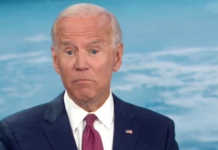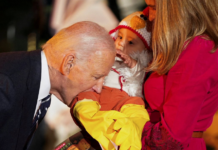President Biden’s willingness to debate former President Trump at least twice before the election has sparked controversy, as the Biden campaign has rejected the nonpartisan organization responsible for managing presidential debates. This move has raised concerns about the legitimacy and fairness of the debates.
According to a letter obtained by The New York Times, the Biden campaign has laid out their terms for the debates, including an earlier start date in June, no participation from independent or third-party candidates, and an in-studio format with no live audience. They have also proposed that moderators be selected from the host network’s regular personnel, in order to avoid bias.
This decision by the Biden campaign shows that they are willing to take calculated risks to improve their chances in the election. With most battleground-state polls showing President Trump in the lead, the Biden campaign needs to reverse this trend and convince voters that he is a strong and effective leader who can handle the economy.
However, this proposal also means that the commission responsible for managing presidential debates, which has been in place since 1988, may become obsolete. The Biden campaign has made it clear that they do not trust the commission to conduct a fair and professional debate, citing their failure to enforce rules in the 2016 debates between Trump and Hillary Clinton.
The proposal also raises questions about the legitimacy of the debates, as the Biden campaign has specifically excluded the participation of independent and third-party candidates. This not only goes against the principles of democracy but also limits the amount of diversity in the debates and potentially silences alternative voices.
Furthermore, the Biden campaign’s request for a debate in June could be beneficial for the president. Early votes are crucial for Democrats, and with the ongoing COVID-19 pandemic, many voters may choose to vote by mail. This could give Biden an edge over Trump, as he did in the 2020 election, where early mail-in votes helped secure his victory.
BREAKING: President Biden’s campaign spokesman, Michael Tyler, says the debate with Trump should “be in studio with no audience.” WATCH pic.twitter.com/XCN6gErUgI
— Simon Ateba (@simonateba) May 15, 2024
The rejection of the Commission on Presidential Debates also highlights the growing tension between the two campaigns. The Trump campaign has repeatedly expressed their eagerness for the president to debate Biden as often as possible, even stating that they do not care who hosts the debate or where it takes place.
The decision by the Biden campaign to reject the commission’s proposed dates and format could have significant implications for the future of presidential debates. If the Biden campaign continues to negotiate directly with networks for possible debates, it could mean the end of the commission and its role in organizing these crucial events.
Donald Trump has already responded to Joe Biden’s “make my day, pal” challenge to debate.
And it is GLORIOUS.
“Crooked Joe Biden is the WORST debate I have ever faced — He can’t put two sentences together!”
“I am Ready and Willing to Debate Crooked Joe at the two proposed… pic.twitter.com/ljghoKvSKX
— Kyle Becker (@kylenabecker) May 15, 2024
Overall, the commission’s rejection and the Biden campaign’s proposal for an earlier, more controlled debate have raised concerns about the debates’ fairness and legitimacy.
It remains to be seen how the Trump campaign will respond and if a compromise can be reached. One thing is for sure: the outcome of these debates could significantly impact the outcome of the election in November.
Joe Biden now says he wants to debate Trump. That’s because he knows he’s losing. This dude required 5 jump cuts in 14 seconds in order to even challenge Trump. This is a candidate in crisis mode.
— Ben Shapiro (@benshapiro) May 15, 2024







